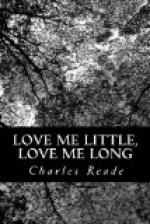His flashes of romance were extinguished by neat little dicta, embodying sordid and false, but current views of life. The gauze wings of eloquence, unsteeled by vanity, will not bear this repeated dabbing with prose glue, so David collapsed and Talboys conquered—“spell” benumbed “charm.” The sea-wizard yielded to the petrifier, and “could no more,” as the poets say. Talboys smiled superior. But, as his art was a purely destructive one, it ended with its victim; not having an idea of his own in his skull, the commentator, in silencing his text, silenced himself and brought the society to a standstill. Eve sat with flashing eyes; Lucy’s twinkled with sly fun: this made Eve angrier. She tried another tack.
“You asked David to bring his fiddle,” said she, sharply, “but I suppose now—”
“Has he brought it?” asked Mr. Fountain, eagerly.
“Yes, he has; I made him” (with a glance of defiance at Talboys).
Mr. Fountain rang the bell directly and sent for the fiddle. It came. David took it and tuned it, and made it discourse. Lucy leaned a little back in her chair, wore her “tout m’est egal face,” and Eve watched her like a cat. First her eyes opened with a mild astonishment, then her lips parted in a smile; after a while a faint color came and went, and. her eyes deepened and deepened in color, and glistened with the dewy light of sensibility.
A fiddle wrought this, or rather genius, in whose hand a jews-harp is the lyre of Orpheus, a fiddle the harp of David, a chisel a hewer of heroic forms, a brush or a pen the scepter of souls, and, alas! a nail a picklock.
Inside every fiddle is a soul, but a coy one. The nine hundred and ninety-nine never win it. They play rapid tunes, but the soul of beautiful gayety is not there; slow tunes, very slow ones, wherein the spirit of whining is mighty, but the sweet soul of pathos is absent; doleful, not nice and tearful. Then comes the Heaven-born fiddler,* who can make himself cry. with his own fiddle. David had a touch of this witchcraft. Though a sound musician and reasonably master of his instrument, he could not fly in a second up and down it, tickling the fingerboard and scratching the strings without an atom of tone, as the mechanical monkeys do that boobies call fine players.
* This is a definition of the Heaven-born fiddler by Pate Bailey, a gypsy tinker and celestial violinist. Being asked for a test of proficiency on that instrument, he replied that no man is a fiddler “till he can gar himsel greet wi a feddle.”
“Great Orpheus
played so well he moved Old Nick,
But these move
nothing but their fiddlestick."*
* See how unjust satire is! Don’t they move their finger-nails?
But he could make you laugh and crow with his fiddle, and could make you jump up, aetat. 60, and snap your fingers at old age and propriety, and propose a jig to two bishops and one master of the rolls, and, they declining, pity them without a shade of anger, and substitute three chairs; then sit unabashed and smiling at the past; and the next minute he could make you cry, or near it. In a word he could evoke the soul of that wonderful wooden shell, and bid it discourse with the souls and hearts of his hearers.




